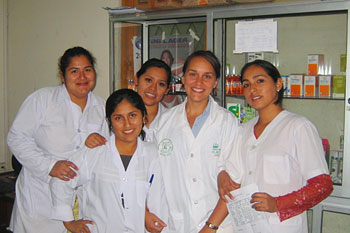OUTREACH
From Ecuador to Mozambique, vet students roam world to improve animal health
In Ecuador last summer, Cornell veterinary student John Cooley hitched rides on milk trucks to dairy farms, where he gave workshops on calf health and conducted research. Student Jennifer Harrison spent nine weeks in Mozambique lecturing on chicken disease.
Cooley and Harrison are among the 10 students who participated in the College of Veterinary Medicine's 2008 Expanding Horizons program, which provides travel grants to vet students, mostly to developing countries, on animal and public health projects.

Veterinary students from UAGRM (Universidad Autnoma Ren Gabriel Moreno). Cornell student Leslie Diaz had the opportunity to work at the veterinary hospital in Santa Cruz, Bolivia, shadowing the veterinarians and assisting with routine cases. See larger image
The students spent between six and 10 weeks completing such self-designed projects as promoting conservation of a mountain gorilla habitat in Uganda and evaluating recent foot-and-mouth disease outbreaks in cattle in Bolivia.
"The Expanding Horizons program is an opportunity for Cornell students to impact the world and be impacted themselves," said Michael Kotlikoff, the Austin O. Hooey Dean of the Veterinary College. "The research these students conduct on site -- in the field or the jungle or a village where chickens roam free -- has the potential to improve the lives of animals and people who are struggling to survive."
In Mozambique, Harrison conducted surveys and gave lectures about the importance of vaccinating chickens against Newcastle disease, a highly contagious infection in domestic and wild avian species. Based on the surveys, she prepared a manual about chicken husbandry and ran her own education programs.
Latoya Schultz spent time in Indonesia researching parasites that affect the endangered Sumatran rhino and other species as part of a health surveillance program.
Missy Turner worked with Conservation Through Public Health in Uganda, which aims to promote conservation and public health by improving primary health care to people and animals in and around protected areas of Africa. Turner brought new laboratory equipment with her and advised and retrained the team on current laboratory techniques. See larger image
Annie Li volunteered at the U.N. Food and Agriculture Organization (FAO) headquarters in Rome, Italy. She created disease information for African horse sickness and porcine reproductive and respiratory syndrome, which will be posted on the agency's Web site. She also wrote a user manual for an animal health information system that tracks certain animal diseases, maps outbreaks and more. Additionally, she designed animal health country profiles for FAO members needing agro-ecological maps, livestock statistics and contact information for potential FAO collaborators. After graduation, Li will pursue a career in public health with hopes to work on an avian influenza surveillance project in Taiwan.
"The FAO was especially a great place to meet leaders in public health who come from many different parts of the world," said Li. "The plethora of languages and accents could always be heard in meetings or even a stroll through the hallways. I found this to be the most stimulating environment and learned to work with people from many different backgrounds and ethnicities."